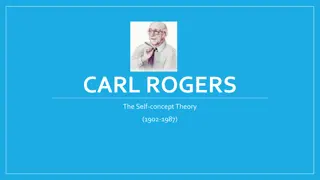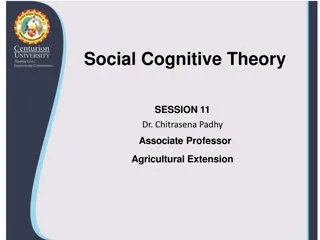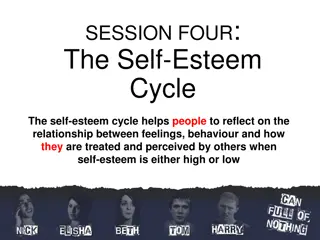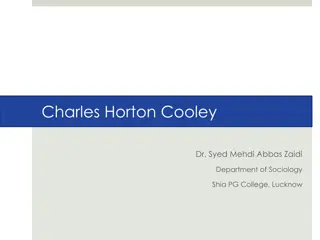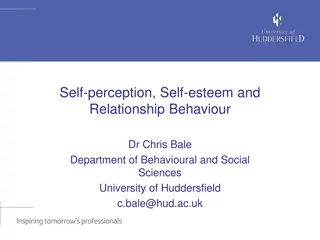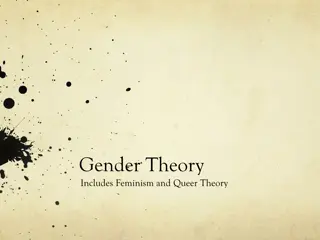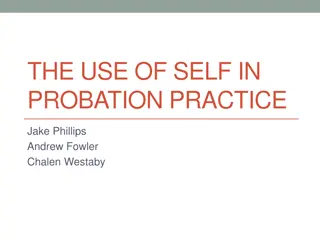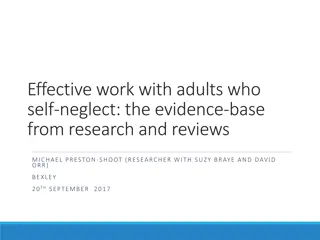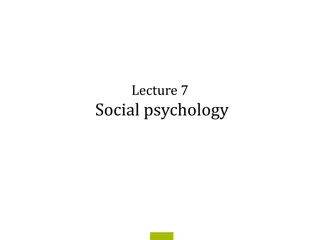Digital Citizenship: Self-Image, Social Media, and Self-Esteem
Explore the impact of social media on self-image and self-esteem. Learn about the influence of filters and media on body perception. Reflect on self-assessment and take-home activities to improve self-confidence.
3 views • 11 slides
Understanding Self-Worth in Children: Building a Strong Foundation
Explore the importance of self-concept, self-esteem, and self-worth in children's development. Learn how parents can positively impact a child's self-perception and self-value through nurturing experiences. Discover the key sources influencing children's self-worth and the critical role of early lif
0 views • 30 slides
Evolution of Mathematical Theories and Proof Systems
Development of mathematical theories such as model theory, proof theory, set theory, recursion theory, and computational complexity is discussed, starting from historical perspectives with Dedekind and Peano to Godel's theorems, recursion theory's golden age in the 1930s, and advancements in proof t
1 views • 29 slides
Understanding Self-Esteem: Meaning, Importance, and Types
Self-esteem is how we perceive our worth and value. High self-esteem leads to confidence and positivity, while low self-esteem can result in self-doubt and negative emotions. Self-esteem impacts mental health, behavior, decisions, relationships, and overall success in life. Recognizing and nurturing
2 views • 15 slides
Understanding Self-Esteem and Ways to Improve It
Self-esteem is our perception of ourselves, impacting how we navigate life. Healthy self-esteem fosters positivity, while low self-esteem can be detrimental. Various factors, like childhood experiences, contribute to low self-esteem, but steps can be taken to improve it. Building positive relationsh
0 views • 14 slides
Understanding the Self: Psychology's Focus and Implications
The field of psychology has long been intrigued by the concept of self, exploring its importance to well-being, self-esteem, and brain localization. Research reveals how excessive optimism, self-bias, and blindness to incompetence can impact self-esteem. Contrasting individualist and collectivist cu
1 views • 41 slides
Psychological Theories of Criminality: Understanding the Roots
Psychological theories of criminality delve into the association between intelligence, personality, learning, and criminal behavior. Major theories include Psychodynamic Theory by Freud, Behavioral Theory by Bandura, and Cognitive Theory by Kohlberg. These theories explore how unconscious mental pro
1 views • 20 slides
Building Self-Confidence: Key Steps and Benefits
Understanding self-confidence, its importance, and how to develop it can lead to enhanced resilience, motivation, reduced fear and anxiety, and a stronger sense of self. Self-confidence allows for confident behavior, while lack of it can lead to self-doubt and avoidance of risks. Learning to embrace
0 views • 7 slides
The Importance of Self-Awareness in Personal Growth
Self-awareness is crucial for understanding one's character, feelings, and motivations. It helps in recognizing strengths and weaknesses, managing stress, improving communication, and fostering empathy. Developing self-awareness involves introspection, mindfulness, self-reflection, and seeking feedb
2 views • 47 slides
Developing a Self-Care Action Plan for Overall Well-Being
Self-care involves deliberate activities to nurture mental, emotional, physical, and spiritual health, yet it is often neglected. This guide explores the essence of self-care, emphasizes the importance of building a personalized self-care action plan, and provides insights into taking care of your b
0 views • 19 slides
Understanding the Theory of Firms: Neoclassical vs. Modern Approaches
The theory of firms is explored through the Neoclassical and Modern perspectives. Neoclassical theory focuses on profit maximization, while Modern theory delves into managerial, principal-agent, and transaction cost theories. The discussion covers criticisms of Neoclassical theory and the essential
1 views • 79 slides
Theories of Causation in Psychological and Social Sciences
Overview of theories of causation categorized into psychological, social psychological, and sociological perspectives. Psychological theories focus on instinctive, biological, and psychological qualities of abusers, including Attachment Theory, Psychodynamic Theory, Social Learning Theory, and Situa
0 views • 15 slides
Carl Rogers and the Self-Concept Theory
Carl Rogers, a prominent figure in personality theory, emphasized individuals' constructive potential and the impact of their subjective experiences on personality development. He viewed individuals as goal-directed and capable of change, with the environment playing a facilitating or inhibiting rol
1 views • 78 slides
Understanding Political Theory through a Contextual Approach
Exploring G.H. Sabine's perspective on political theory through a contextual approach, emphasizing the importance of historical context and societal influences. Sabine argues that while political theory evolves with its contemporary politics, it should be analyzed within its specific time and social
0 views • 9 slides
Enhancing Self-Confidence for Professional Success
Understanding the importance of self-confidence in the workplace is crucial for personal growth and career advancement. Self-confident individuals trust their abilities, maintain a sense of control over their lives, and have realistic expectations. This summary delves into the characteristics of sel
0 views • 13 slides
Evolution of Light Theory: From Wave Theory to Quantum Theory
At the turn of the century, the discovery of the photoelectric effect challenged the wave theory of light, leading to the development of the quantum theory by Max Planck and Albert Einstein. This new theory introduced the concept of discrete energy units known as quanta, bridging the gap between wav
1 views • 62 slides
Understanding Social Cognitive Theory: Insights from Albert Bandura
Social Cognitive Theory, developed by Albert Bandura, emphasizes learning through observation and modeling behaviors. The theory explores how individuals acquire new behaviors, thoughts, and attitudes by observing others. Bandura's famous Bobo doll experiment showcased how children imitated aggressi
6 views • 17 slides
Understanding the Self-Esteem Cycle: High vs Low Self-Esteem
The self-esteem cycle explores the interplay between one's feelings, behavior, and how they are treated based on their self-esteem level. High self-esteem is associated with positive feelings, supportive behavior, and positive interactions, while low self-esteem manifests in negative emotions, withd
9 views • 4 slides
Dp-branes, NS5-branes, U-duality, and M-Theory Overview
Overview of Dp-branes, NS5-branes, and U-duality derived from nonabelian (2,0) theory with Lie 3-algebra. Introduction to M-theory, including M2-branes and M5-branes in the strong coupling limit. Discussion on BLG theory, Lorentzian Lie 3-algebra, and the ABJM theory for M2-branes.
1 views • 32 slides
Charles Horton Cooley - Sociologist and Creator of the Looking Glass Self
Charles Horton Cooley, an American sociologist associated with the University of Michigan, is best known for his concept of the looking-glass self. Cooley's major works span topics like social change, human nature, and social consciousness. His Looking Glass Self theory explores how individuals form
1 views • 18 slides
Enhancing Self-Regulation for Formative Assessment through Social and Emotional Learning
Explore the significance of self-regulation in formative assessment, understand key concepts like self-control, emotional competence, and perseverance. Discover actionable strategies to implement self-regulation interventions with students and train other adults effectively. Future orientation and s
0 views • 25 slides
Understanding Mindful Self-Judgment and Its Role in Mental Health
Mindful self-judgment is a complex concept that involves balancing self-awareness and self-compassion. While nonjudgment is a key aspect of mindfulness practices, there is a debate on whether mindful self-judgment can be appropriate and functional in certain circumstances. Researchers like June Pric
2 views • 46 slides
Understanding Time-Independent Perturbation Theory in Quantum Mechanics
Perturbation theory is a powerful tool in solving complex physical and mathematical problems approximately by adjusting solutions from a related problem with known solutions. This theory allows for more accurate approximate solutions by treating the difference as a small perturbation. An example inv
0 views • 19 slides
Ethical Theories: Divine Command vs. Virtue Theory Explained
Divine Command Theory asserts that morality is derived from God's commands, contrasting with Virtue Theory which focuses on developing moral virtues to achieve human flourishing and excellence. Divine Command Theory relies on religious texts, while Virtue Theory emphasizes the cultivation of virtues
0 views • 24 slides
Understanding Self-Esteem: Highs and Lows
Self-esteem is the judgment we hold about ourselves, shaped by experiences and relationships. High self-esteem individuals embrace new encounters with confidence and positivity, while low self-esteem individuals struggle with self-doubt and criticism. Recognizing signs of low self-esteem is crucial
0 views • 11 slides
Understanding Fermi Liquid Theory in Interacting Fermion Systems
Fermi liquid theory, also known as Landau-Fermi liquid theory, is a theoretical model that describes the normal state of metals at low temperatures. Introduced by Landau and further developed by Abrikosov and Khalatnikov, this theory explains the similarities and differences between interacting ferm
0 views • 23 slides
Enhancing Self-Regulation Skills in Children: Strategies and Tips
Understanding and fostering self-regulation in children is crucial for their development. Self-regulation involves controlling impulses, focusing, and shifting between tasks. This article delves into the internal mechanisms of self-regulation, such as executive function, and provides practical tips
1 views • 22 slides
Computational Learning Theory: An Overview
Computational Learning Theory explores inductive learning algorithms that generate hypotheses from training sets, emphasizing the uncertainty of generalization. The theory introduces probabilities to measure correctness and certainty, addressing challenges in learning hidden concepts. Through exampl
0 views • 43 slides
Automata Theory and Theory of Computation Overview
This course overview covers concepts in automata theory and theory of computation, including formal language classes, grammars, recognizers, theorems in automata theory, decidability, and intractability of computational problems. The Chomsky hierarchy, interplay between computing components, modern-
0 views • 42 slides
Boosting Your Child's Self-Esteem & Confidence in Parenting Workshop Series
Understanding self-esteem in children is crucial for their emotional development. Healthy self-esteem leads to positive behaviors, while low self-esteem can result in negative self-perceptions. Recognizing signs of healthy and unhealthy self-esteem allows parents to support and nurture their child's
0 views • 11 slides
Enhancing Self-Efficacy and Self-Determination in the Workplace
Establishing high levels of self-efficacy and self-determination in the workplace is crucial for accomplishing tasks and goals effectively. This publication explores the significance of these traits, providing strategies for managers to foster and maintain them. Discover why self-efficacy and self-d
0 views • 8 slides
Theories of Interest in Microeconomics II
Explore various theories of interest in economics, including the Classical Theory, Liquidity Preference Theory by Keynes, Productivity Theory, Abstinence Theory, Time-Preference Theory, Fisher's Time Preference Theory, and the Loanable Fund Theory. These theories offer different perspectives on the
0 views • 6 slides
Exploring the Evolution of Atomic Theory
Delve into the historical journey of atomic theory starting from Democritus and Aristotle's views to modern advancements proving some aspects of Dalton's theory incorrect. Learn about key laws and theories such as the Particle Theory of Matter, Dalton's Atomic Theory, and JJ Thomson's discoveries, s
0 views • 30 slides
Understanding Self-Perception, Self-Esteem, and Relationship Behavior
The discussion explores the impact of low self-esteem on various psychological issues, societal views on self-worth, self-perception biases, and the consequences of self-esteem in different aspects of life, backed by research and theories such as the Better-Than-Average Effect and Sociometer Theory.
0 views • 19 slides
Exploring Gender Theory: Feminism and Queer Theory in Art and Music
Delve into the realms of Gender Theory, Feminism, and Queer Theory through art and music, examining how gender and sexual orientation impact creativity and societal perceptions. Analyze the significance of these theories in interpreting stories, poems, and songs, and consider the implications of pow
0 views • 12 slides
The Use of Self in Probation Practice: Understanding Self-Disclosure and Its Implications
Explore the concept of self-disclosure in probation practice, examining different methods, findings, and implications. Discover the two schools of thought regarding self-disclosure and delve into the various realms and subtypes of self-disclosure practices. Gain insights into the forms of self-discl
0 views • 25 slides
Understanding Self-Neglect in Adults: Challenges and Research Insights
This content delves into the complex issue of self-neglect in adults, covering its definition, key challenges, and the research evidence available. It explores the various aspects of self-neglect, including neglect of self-care, domestic environment, and refusal of services. The challenges associate
0 views • 39 slides
Understanding the Self in Social Psychology
Delve into the concept of the individual and the self in social psychology, exploring how identities have evolved historically and the distinction between collective and individual selves. Learn about self-awareness, Wundt's differentiation of I and me, and Higgins' self-discrepancy theory, shedding
0 views • 84 slides
Macromechanical Analysis of Lamina and Tsai-Hill Failure Theory Overview
The Tsai-Hill failure theory is based on the strengths of a unidirectional lamina, incorporating longitudinal and transverse tensile and compressive strengths, as well as in-plane shear strength. This theory, derived from the distortion energy theory, provides criteria for determining lamina failure
0 views • 15 slides
Boosting Self-Esteem: Benefits and Tips for Improvement
Understanding self-esteem, its benefits, and risks of low self-esteem are essential for personal growth. Developing high self-esteem can lead to increased self-respect, goal achievement, and willingness to try new things. On the other hand, low self-esteem can make individuals vulnerable to peer pre
0 views • 10 slides












